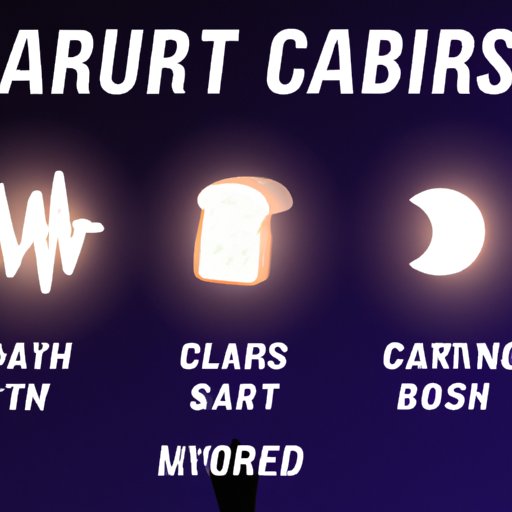Introduction
Eating carbohydrates is an important part of any healthy diet, but it can be difficult to know when to eat them. This article will explore the importance of balancing carbs in your diet, who this article is for, how to balance carbs in your diet, the best times of day to eat carbs, strategies for eating the right amount of carbs, what you need to know about eating carbs at night, meal timing and carbohydrates – why it matters, what happens when you eat too many carbs, and the benefits of eating carbs at certain times of day.
How to Balance Carbs in Your Diet
In order to balance carbs in your diet, it’s important to understand the different types of carbs, the glycemic index, and how to calculate your daily carb needs. There are three main types of carbohydrates: simple carbs, complex carbs, and fiber. Simple carbs are sugars found in foods like candy, cakes, and cookies. Complex carbs are starches found in grains, legumes, fruits, and vegetables. Fiber is found in whole grains, beans, fruits, and vegetables.
The glycemic index (GI) is a measure of how quickly a food raises your blood sugar level after you eat it. Foods that raise your blood sugar quickly have a high GI, while foods that take longer to digest and don’t cause a quick spike in blood sugar have a low GI. Knowing the GI of certain foods can help you make better choices when it comes to balancing carbs in your diet.
Once you understand the different types of carbs and the glycemic index, you can start calculating your daily carb needs. The recommended daily intake of carbohydrates is 45-65% of your total calorie intake. If you’re trying to lose weight, aim for the lower end of the range. If you’re trying to maintain your current weight, aim for the higher end of the range.

The Best Times of Day to Eat Carbs
Now that you understand the basics of balancing carbs in your diet, let’s look at the best times of day to eat carbs. It’s generally recommended that you eat the majority of your carbs early in the day, as this gives your body time to digest and use the energy from the carbs before bedtime. Here’s a breakdown of the best times of day to eat carbs:
- Early in the day: Eating carbs early in the day will give you energy for the day ahead. Try to include some complex carbs in your breakfast, such as oatmeal or whole grain toast.
- Mid-morning snack: A mid-morning snack is a great way to keep your energy levels up throughout the day. Choose something with complex carbs, such as a piece of fruit or a handful of nuts.
- Lunchtime: Aim to include some complex carbs in your lunch, such as a salad with grilled chicken or whole grain pasta.
- Afternoon snack: An afternoon snack is a great way to keep your energy levels up until dinner. Choose something with complex carbs, such as a piece of fruit or a handful of nuts.
- Dinner: Eating complex carbs at dinner will give you energy throughout the evening. Try to include some complex carbs in your dinner, such as brown rice or quinoa.
- Before bed: Eating complex carbs before bed can help stabilize your blood sugar levels overnight. Try to include some complex carbs in your dinner, such as oatmeal or a slice of whole grain bread.
Strategies for Eating the Right Amount of Carbs
Once you know the best times of day to eat carbs, you can start implementing strategies to ensure you’re eating the right amount of carbs. Here are some tips to help you get started:
- Counting carbs: Counting carbs can help you monitor your carb intake and make sure you’re eating the right amount. Use an app or website to track your carb intake and keep track of how many carbs you’re eating each day.
- Meal planning: Meal planning is a great way to ensure you’re eating the right amount of carbs. Plan out your meals for the week and make sure you’re including the right amount of carbs in each meal.
- Portion control: Portion control is key when it comes to eating the right amount of carbs. Measure out your portions and stick to the recommended serving sizes to make sure you’re not overeating.
What You Need to Know About Eating Carbs at Night
Eating carbs at night can have negative effects on your health, so it’s important to understand the risks before you do it. Here are some things to consider when it comes to eating carbs at night:
- Effects on blood sugar levels: Eating carbs at night can cause your blood sugar levels to spike, leading to fatigue and difficulty sleeping. If you must eat carbs at night, choose complex carbs like oatmeal or whole grain bread.
- Weight gain: Eating carbs at night can lead to weight gain if you’re not careful. Make sure to stick to portion control and monitor your carb intake to avoid overeating.
- Sleep disturbances: Eating carbs at night can interfere with your sleep patterns, leading to difficulty falling asleep and staying asleep. If you must eat carbs at night, choose complex carbs and avoid processed foods.

Meal Timing and Carbohydrates – Why It Matters
Meal timing and carbohydrates are important factors to consider when it comes to balancing carbs in your diet. Eating carbs at the right time of day can have a number of benefits, including improved metabolism, increased energy, and reduced cravings. Here are some of the benefits of eating carbs during different times of day:
- Blood sugar control: Eating carbs at the right time of day can help regulate your blood sugar levels and prevent spikes in insulin. This is especially important for people with diabetes.
- Improved digestion: Eating carbs at the right time of day can help improve digestion and reduce bloating. Eating complex carbs at night can also help reduce hunger pangs.

What Happens When You Eat Too Many Carbs
Eating too many carbs can have a number of negative effects on your health. Here’s what you need to know about eating too many carbs:
- Weight gain: Eating too many carbs can lead to weight gain, as your body will store the extra calories as fat. Make sure to stick to the recommended daily intake of carbs to avoid overeating.
- Blood sugar spikes: Eating too many carbs can cause your blood sugar levels to spike, leading to fatigue and difficulty concentrating. Make sure to monitor your carb intake to avoid blood sugar spikes.
- Fatigue: Eating too many carbs can lead to fatigue, as your body has to work harder to process the extra calories. Make sure to stick to the recommended daily intake of carbs to avoid fatigue.

Benefits of Eating Carbs at Certain Times of Day
Eating carbs at certain times of day can have a number of benefits, including improved metabolism, increased energy, and reduced cravings. Here are some of the benefits of eating carbs at certain times of day:
- Improved metabolism: Eating carbs at the right time of day can help boost your metabolism and increase your energy levels. Eating complex carbs at night can also help stabilize your blood sugar levels overnight.
- Increased energy: Eating carbs at the right time of day can help give you energy throughout the day. Eating complex carbs in the morning can help kickstart your day and give you energy for the day ahead.
- Reduced cravings: Eating carbs at the right time of day can help reduce cravings and keep you feeling fuller for longer. Eating complex carbs in the afternoon can help prevent afternoon snacking and keep you feeling energized throughout the day.
Conclusion
Balancing carbs in your diet is an important part of maintaining a healthy lifestyle. Understanding the different types of carbs, the glycemic index, and calculating your daily carb needs can help you make better choices when it comes to balancing carbs in your diet. In addition, knowing the best times of day to eat carbs and implementing strategies for eating the right amount of carbs can help ensure you’re getting all the nutrients you need. Finally, understanding the risks of eating carbs at night and the benefits of eating them at certain times of day can help you make informed decisions about when to eat carbs.
By following these guidelines, you can ensure you’re eating the right amount of carbs and getting all the nutrients you need. Eating the right amount of carbs at the right time of day can help boost your metabolism, increase your energy levels, and reduce cravings.
(Note: Is this article not meeting your expectations? Do you have knowledge or insights to share? Unlock new opportunities and expand your reach by joining our authors team. Click Registration to join us and share your expertise with our readers.)
